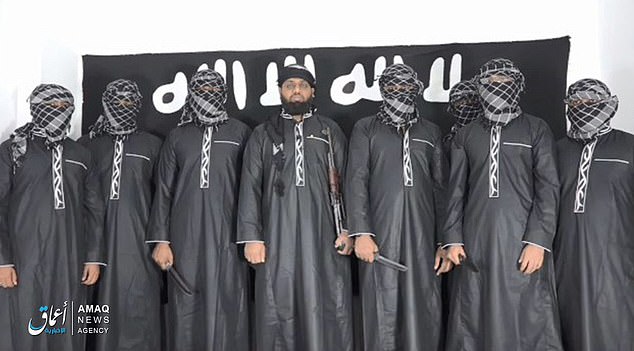Islamic State (IS) chief Abu Bakr al-Baghdadi has resurfaced and claimed that suicide-bombings in Sri Lanka which left over 250 dead was a revenge for being ousted in Baghouz, their last stronghold in Syria.
Now try to make sense. Lanka terror ring-leader Moulvi Zahram Hashim blows himself up. As does most in his family. Filthy rich young Ahmed Ibrahim (31) and Ilham Ibrahim (31) self-destruct themselves as does the wife of latter with her three children. I mean all this for a cause a world away? To give up everything you have for a place which has only 10,000 for population, no historical or holy value nor any family roots? I mean for what?
Why Islam is such a magnet for suicide-bombers?
Islam teaches its adherents that the present life is transitory and should only be a preparation for afterlife. Death is the goal, how you reach it leads to the prize of eternal life.
It’s one of the core teachings of the Quran. “Only he who is saved far from the Fire and admitted to the Garden will have attained the object (of life): for the life of this world is but goods and chattels of deception (3:185).”
And how do you reach this goal? Both the Quran and the hadith tells you that most glorious Muslims are those who are warriors to the cause of Allah. They not only must welcome the war but also death in war because it gives you the highest of the seven levels of paradise. All your sins are immediately forgiven. This afterlife is invoked five times a day during ritual prayers. Islam has the tradition of individual martyrs not only committing suicide but also killing others for religious reasons.
So don’t you believe that it all began with 9/11 when suicide bombers plunged into world trade towers in New York. In 1980 a 13-year-old Iranian kid blew himself up under an Iraqi tank during the Iran-Iraq War ( Ayotallah Khomeini declared the boy a national hero in its wake). In 1983, suicide bombing of the US marine corps in Lebanon left 241 American military personnel dead. For Shias and Sunnis this is the most common method to kill each other. Already this year we have grave suicide-bombing in Afghanistan and Pulwama, the latter with the embedded threat of a nuclear holocaust.
And don’t be mistaken that Muslim clerics call it “suicide.” For them this is shahada (martyrdom). Suicide is born out of a feeling of hopelessness. In case of martyrdom, it’s a fulfillment of a successful life. Streets and squares are named after them. Newspapers describe such funerals as “wedding” of their heroes. Mothers of suicide-bombers talk as if their sons had gone off to get married.
Mariam Farhat is known as “mother of martyrs” in Palestine. She encouraged three of her sons to attack Israel that cost them their lives. Listen to her words: “Sons are precious but for the sake of Allah, what is precious becomes cheap.” But does she condone her sons taking innocent lives? “Yes. Because I love my son. And I wanted to choose the best for him. And the best is not life in this world.” (That’s why you have the hadith: Paradise lies under the feet of the mothers.)
It’s true of most of Muslim world. On Egyptian TV, you have preachers exhorting kids “the love of martyrdom for the sake of Allah.” On Al Jazeera, 10-year-old kids are swearing to be martyrs. In Somalia, fathers are recruiting their kids to become suicide bombers and film their “martyrdom” feats. Same with leaders of Boko Haram who want their children to be martyrs.
In 2014, a British-born woman Umm Layth tweeted on her new life as wife of a Syrian IS fighter: “There’s no way to describe the feeling of sitting with the sisters and waiting on news of whose husband has attained shahada. She has thousands of followers on twitter.
Former Israeli prime minister Golda Meir captured this bewilderment perfectly: “We will only have peace with the Arabs when they love their children more than they hate us.”
In Islam, paradise is a goal, a destination infinitely more preferred to the one on earth. The most spectacular way to enter paradise is as a martyr, by the open embrace of an early death. Martyrdom is the most effective pathway to paradise.
And what’s this paradise?
The Quran has a very vivid description of it: “In them will be maidens, chaste, restraining their glances, whom no man or jinn before them has touched (55: 46-50).”
Al-Ghazzali, second only to Prophet Muhammad in terms of importance, narrates a hadith thus:
“These places (in paradise) are built of emeralds and jewels and in each buildings there will be 70 rooms of red colour and in each room seventy sub-rooms of green colour and in each sub-room there will be one throne and over each throne, seventy beds of varied colours and on each bed a girl having sweet black eyes..there will be seven girls in each room…each believer will be given such strength in the morning as he can cohabit with them.”
These virgins “do not sleep do not get pregnant, do not menstruate, spit, or blow their noses, and are never sick.”
In early 2013, more than 120 Muslim scholars from around the world signed a letter denouncing Islamic State as “un-Islamic.” Yet the letter doesn’t question the concept of martyrdom or challenges the primacy of afterlife.
It’s such half measures which don’t allow reform and put the world in perennial danger.


